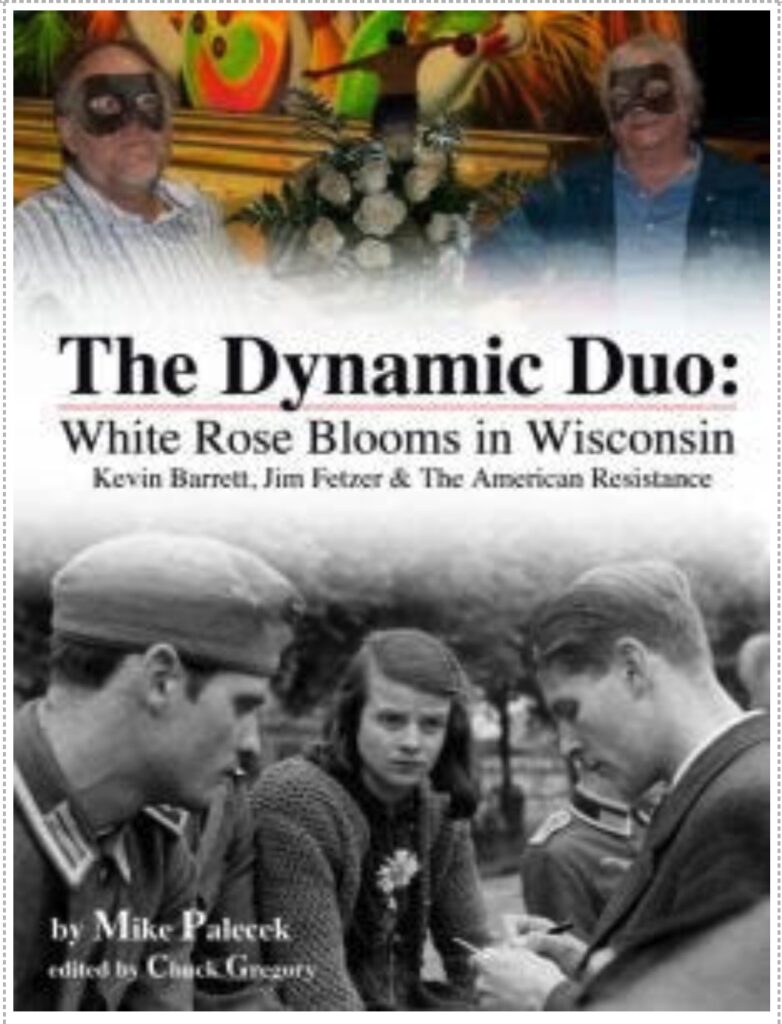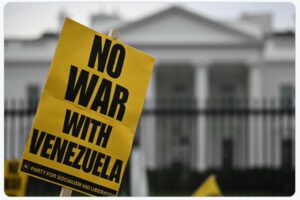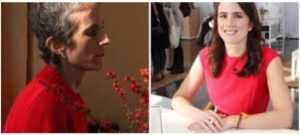Mike Palecek
A White Rose Blooms in Wisconsin
Kevin Barrett, Jim Fetzer & The American Resistance
A man once said that the pinnacle of success is when you’ve finally lost interest, in money, compliments, and publicity.
— Todd Snider
“Let’s face the fact, this country needs a revolution every bit as much as Hasni Mubarak’s Egypt needed a revolution. The question is, what will it take?”
– Kevin Barrett
Our history stems from that day, from that place.
From Nov. 22, 1963, about 12:30 p.m.
Dallas, Texas. Memphis. Los Angeles. Oklahoma City. New York City. Washington, D.C. Eveleth, Minnesota.
Aurora. Sandy Hook. Boston. Fallujah. Kabul. Kandahar.
And whatever is happening right now.
What is coming.
Unless we stop it.
Us. You. Me.
We.
Who was really behind the anthrax attacks?
Isn’t it important? At least as important as Paul Revere’s ride? Or a cracked bell?
Have you ever Googled “JFK assassination” at 11:30 at night, maybe after a couple of drinks, and then found yourself still on the computer in the living room when the family is getting up for school and work?
I used to make a wish upon a star, daydream that when I die, I would ask, the very first thing after I set down my suitcases, “Who killed JFK?”
But now, thanks to the tears and sweat and blood of Jim Fetzer, Kevin Barrett and many others,
I can save that wish, keep that “one big question” for something else, because I already know, thatone.
Jim Fetzer and Kevin Barrett do not face being beheaded by a guillotine in the basement of the county building on the corner of Main and First, not that we know of, if someone finds out about their writings or hears their radio shows or sees them speak at a public gathering.
That is not the American means of beheading.
An American cuts off your head at your neck by taking away the ball, it’s his anyway, not allowing you to play, by rolling his eyes at you as you pass on the street, as he passes the stuffing across the Thanksgiving table, interviews you on national television.
You may live here, die here, you will be free to do what you want, say what you want, but we will speak no more about you.
That is how it has gone all these years in America, at least since Nov. 23, 1963.
But still there are those who care enough to try a full-court hook shot with time running out.
And they are heroes whether that shot goes in or not.
The White Rose students wrote leaflets, words, and distributed them and were considered worthy of decapitation by the government.
Jim Fetzer and Kevin Barrett write and speak, making
their education, experience, ideas and opinions available to as many people as they can.
And no doubt they are also known and reviled by those in power.
They are a face of the resistance in America, which does exist, in many forms.
The resistance in America has a long and storied history from the Wobblies and Socialists and all those who fought and died and wrote and spoke and suffered and sang and shouted, for workers rights, against war, women’s rights, for the earth, since the first white man stepped foot on this land, nudged the white man standing next to him, and said that this was now their land.
And all the way up from Ammon Hennacy, Dorothy Day, Peter Maurin, Emma Goldman, so many names unknown to American school children and now American adults.
Up through the now-famous resisters of the 1960s, famous because of their acts and courage and also because the American media at that time was not yet so much a part of the state, not yet Tass and Izvestia.
But those holes in the wall were soon filled in.
We do not know of the Plowshares Heroes.
We do not know the names Helen Woodson, Carl Kabat, Larry Cloud Morgan, Paul Kabat, Frank Cordaro, John LaForge, Barb Katt, many, many others.
Why aren’t the blue-collar words of Phil Berrigan etched below his smiling statue in Washington,
D.C. that tourists can climb on, sit on, take their photos, and the poetry of his brother Daniel etched in stone above the entrance to the Supreme Court.
There are names, many names, many faces, as ghostly and invisible as the dead faces of the brown people in El Salvador, Guatemala, Iraq, Afghanistan.
Does anyone know the names Kevin McGuire, Jean Petersen, Darrell Rupiper, Larry Rosebaugh, Roy Bourgeois, Megan Rice, Greg Boertje-Obed, Michael Walli, Brian Terrell?
No.
All are members of the American White Rose, resisters to the empire, unknown to their countrymen, yet very real.
“This is, uh, Jim Fetzer and I’m pleased to welcome my special guest today …”
“This is Kevin Barrett. Welcome to another week of Truth Jihad Radio on the American Freedom Radio network. I’m your host, Kevin Barrett, trying to get the most important corrections to the official narrative …”
Fetzer & Barrett.
Barrett & Fetzer.
They became The Dynamic Duo in order to pitch a new radio show they were starting together.
Jim makes sure that I know that he is Batman and Kevin is Robin.
“When you talk about The Dynamic Duo,” says Jim, “I was offered five days a week and invited
Kevin to join me in doing the M/F shows. He said, ‘Well, I guess that makes me The Boy Wonder,’ and I frequently made reference to him by that name.”
Well, okay, but since that time it might be hard to say …
Which is Batman?
Which is Robin?
Probably they are both, both.
Both are leaders. Neither would fit the role of a sidekick, but each is a ready, willing ally and supporter of the other.
And for sure in these times we need some heroes.
Turn on the Bat-Signal, light the searchlight.
Send out the call.
Dr. Kevin Barrett and Dr. James Fetzer are very much a part of all that, that tradition of foresight and courage and action and struggle.
Jim grew up in California, went to college at Princeton, served four years in the Marines, returned to attend graduate school at Indiana University. He then taught philosophy at the University of Kentucky and other schools, finally ending his career at the University of Minnesota Duluth.
Along the way he wrote on many academic topics as well as beginning to make his forays into so-called conspiracy research.
He has written many articles, spoken at public gatherings, and interviewed many guests on his radio show as well as being a guest, many, many times.
To anyone who knows him, he is a fighter.
To this day, he continues to fight.
Kevin Barrett grew up in Madison, Wisconsin, earned his undergraduate degree in journalism at the University of Wisconsin, and dreamed of being a radical writer.
He eventually drove a mobile home out to San Francisco to take his turn at being the next Tom Wolfe or Hunter S. Thompson. He lived in the bus for years on the streets and beaches of the Bay Area.
While undertaking graduate studies at San Francisco State, Kevin went on junkets to Mexico and Central America, and spent a year in Seattle working for The Nuclear Freeze and getting that whole Grunge thing going.
He wrote Dr. Weirde’s Guide To Weirde San Francisco, and became a successful writer.
He also studied in Paris and while there he convinced the national French media he was a famous Hollywood producer, just for kicks.
And there was an Amtrak train ride around America. Remember that? Three stops anywhere in the U.S. for less than $300.
Well, Kevin took a trip from San Francisco to New Orleans, and during the stop in New York City he met his future wife. He would soon turn his life over to Islam.
And that historic event would help him in his present fight, his Jihad, his quest for truth, for justice, riding his cane pony at the sunset not because he believes he can reach it, but because it is there, jousting with any unlucky windmills along the way.
This is not the definitive biography of Jim Fetzer, not the last word on Kevin Barrett. It’s a good try.
It is a beginning.
In preparation for writing, I take a trip from Saginaw, near Duluth, to Madison, Wisconsin.
I get to Oregon, a Madison suburb, to Jim’s house, just before he is to start his radio show at 5 p.m.
He greets me with a big smile and shows me around. I’ve been interviewed by him a few times. He is a monthly columnist on the weekly radio show that I co-host. I’ve read a few of his books and many of his articles.
I know that some people don’t like Jim. I know that many people love him.
The reason I wanted to do this book, that I asked Jim and Kevin if they would let me do this book, was because I think they are the cutting edge. They know the truth about America, and for years and years they have been doing everything they can to get the word out.
If Jim Fetzer and Kevin Barrett could host The Nightly News for one month our world would be changed forever. There is no question about it.
It turns out the media is that important. Information is that big a deal.
You listen to Dan Rather, Peter Jennings, Tom Brokaw, Brian Williams for years, and you get Fascist America, over time.
You put Kevin Barrett and Jim Fetzer in their spot and you get Thomas Jefferson’s America, Ben Franklin’s, Tom Paine’s.
Jim interviewed me as part of the show and as usual did most of the talking. He then took me out to a great dinner at The Outback.
He was saddened to learn that not all of the people he asked me to contact to comment on his life have responded.
We then headed out to his daughter Sarah’s home to meet her and husband, Scott, who would be taking the cover photo on Saturday morning.
On the way Jim got a call from a friend in Minneapolis.
Jim talked loudly, animated when the friend said Putin had said he was going to put peacekeeping troops in Syria. Jim was glad, and also proud to know that it had been his idea first. He had remarked on Press TV that Russia should take a stand against American and Israeli aggression in the Middle East. The idea might have come from Jim. Who knows? It is possible.
While waiting in The Outback to be seated I asked Jim if he was going to Syria, along with Kevin and Gordon Duff. I had heard about the plans. He said, no, and it seemed to me that he considered it a dangerous trip.
So, I had an idea, while being seated behind a giant can of Fosters, to ask for another, and perhaps another. Would that be enough to stack and hide behind? If need be. The kind of barricades I would prefer.
I got a feel that this might be where it’s happening. History. The resistance. The revolution. While eating a blooming onion with Professor Jim Fetzer.
This biography is not symmetrical.
Maybe it started out wanting to be, but it can’t.
Barrett and Fetzer are not equal halves of some American apple pie. I have tried to be fair with space and with questions, etc., but I’m pretty sure it’s not exactly half and half.
In fact, I know it’s not.
While sitting in the Weary Traveler cafe in Madison with Kevin we went over some of his scrapbook photos to see what might be included in this book.
Kevin walks with a cane now, because of hip surgery.
He has to wait for an infection to heal before the other side gets done.
He talks and points and squints to see the newspaper articles across the table as I hold the book.
He talks about his students, the university, the controversy that overtook his life when he came out against the official story of 9/11 while still an instructor at the University of Wisconsin.
We look over the letters to the editor, in support and not. Kevin points out the front-page story, with his photo, in the Chicago Tribune, the feature stories in The New York Times.
He says the photographers were on his side, the writers not so much.
He points at a story in The Badger Herald, one of the student papers, with quotes from his former students in support of him, and asks if that can get into the book, into the record, that his students liked him, thought he was a good guy, a good teacher, that he was not a propagandist.
He was a good teacher.
I look over at Kevin. He’s disheveled, though he tries not to be. He’s got on what I could call “church clothes” for the photo shoot. He’s rugged, kind of beaten-down, though he is a big man.
Since getting blacklisted from teaching, he’s been struggling to make ends meet.
There are deep roots in southern Wisconsin.
Kevin’s grandfather Hunk was principal of East High School in Madison on the working class side of town, and his grandmother Bee was a friend, advocate, and defender of Frank Lloyd Wright, who was not yet totally appreciated in the area for his lifestyle and belief that every American deserved a decent house and decent living, “believing in designing structures which were in harmony with humanity and its environment, a philosophy he called ‘organic architecture’.”
On Friday night after the Outback, after visiting Sarah and Scott, Jim and I return to his basement and walk around, looking at an array of photos to see what might be included in the book.
There will be too many.
There is a baby album, where Jim’s mother has taken great care to record the big events, a lock of hair, how big, how long, when, where.
There is an Altadena kindergarten report card narrative.
“Plays well with group.”
“He learned quickly where his cot and locker were located.”
“Very happy with his environment most of the time.”
“Jimmy only cries when there is sufficient hurt or when another child is over-aggressive with him.”
Class photos. First grade, second grade.
“Can you believe,” says Jim.
Third grade. Teacher Ethel Stone. 1949.
“Jim is gaining in confidence. He seems to be quite a sensitive child and could be very easily misunderstood.”
“He should move away from the jungle gym and join the boys in the various games that they play.”
Family vacations, Yosemite, being commissioned as a second lieutenant at Princeton.
There, there’s the move to South Pasadena from La Habra, after …
And the photos of the six-week bicycle tour of Europe at age 15 after graduating from junior high.
And the trip to Mexico between junior and senior year …
And Japan between graduating high school and going to college …
Jim will probably come back down here later, after I leave, and lean over these boxes, remembering, as we all do, eventually.
There is a portrait on the wall of Jim as a young professor, done by an artist at Kentucky. There are photos with Jesse Ventura and Vince Bugliosi, Dennis Kucinich, a talented drawing done by Chauncey Holt, an original painting, etc., etc. We look through military photos, old journals, an autobiography Jim wrote in the ninth grade.
We talk about the photos.
I ask questions.
Jim has the answers.
Chauncey Holt was one of the three tramps. Woody Harrelson’s dad was also one. “Woody knows that.” The tramps were being set up to be the patsies if Lee Oswald didn’t pan out. The shooting was set for the speech at the Trade Mart if Dealey Plaza didn’t work, and then later at LBJ’s ranch that night if need be.
“Yeah, yeah, yeah,” Jim says when I ask something.
His voice goes high when he’s excited or amused. He laughs hardest when the joke is on himself.
And then we sit down for an hour interview until midnight, to wrap-up, put a bow around it, to the night, to Jim’s interview portion of the book.
On that Saturday morning I am having my coffee and looking over Jim’s photos.
Jim is on his computer on the opposite end of the table.
He gets a phone call and begins talking loudly with someone regarding a submission to the Veterans Today website that Jim needs to okay in his capacity as editor.
In the meantime Jan is talking to me about the various cruises she has taken to Europe. I’m hearing Jim in one ear and St. Petersburg in the other. Jan doesn’t seem to hear Jim.
I leave myself an hour to go pick up Kevin for the cover photo shoot, then head out toward Lone Rock. I begin thinking that it’s going to be a short jaunt, because we need to get to the Badger Bowl by eleven.
But it’s kind of a long drive along West 14 through the river valley, through Cross Plains, Black Earth, Arena, Spring Green.
Kevin, Fatna, Hakim and Karim live back in the woods, in a cabin, with a cabin mosque in the front yard, and wood, gardens, an old tree house.
I go inside to get Kevin, greet Hakim, and ask to use the restroom.
It’s a compost toilet.
I’ve never seen one before.
I figured it out.
Later, in town, Kevin is scrunched inside my little Honda. We’re sitting parked outside the Badger Bowl. We can’t go inside, there’s a rock concert in the bowling alley parking lot.
So, we’re talking while we wait for Jim and Scott to find another bowling alley. Kevin points to the church lot to our right and notes that they are composting, using mulch, something like that, something I never notice or care about.
And I realize that Kevin has fought the fight, that long fight they are always talking about that’s good to fight and all that. And he’s still right in the middle of it. He gives a shit about compost and ecology, and he doesn’t have a TV. Years ago, when my kids were small, I carried the TV downstairs, and under great familial pressure lugged it back up probably the next day.
Kevin’s TV is still down there.
Kevin, who read everything he could get his hands on in the back of the station wagon driving around the country, who as a high school student heard Mark Lane tell the truth about the JFK assassination, who studied journalism in college and wanted to be a writer like Hunter S. Thompson or Tom Wolfe, who went to San Francisco to find the sun, found Islam and love, was cursed or blessed with the real knowledge about the attacks of Sept. 11, 2001, and has really never stopped, to this moment, seeking, trying.
Later while we are in the Weary Traveler looking over old clippings that tell about the most intense time of his life, I see that seven years ago he would not have had the cane or some of the lines in his face; he would have been able to see better and perhaps someone in this folksy restaurant would know him, maybe come over to shake his hand.
Nobody does today.
Nobody knows him.
The friend of his that runs the restaurant is not here today.
The clippings, from The Capital Times, The New York Times, the Chicago Tribune, lauding or lambasting Kevin Barrett for standing up to the people and government of the United States of America, kind of shrivel and yellow and just lie there.
But Kevin Barrett lives.
We talk about this book.
Kevin doesn’t really like the title, too busy.
He says he would, if he were writing the book, call it something like American Dissident.
And I can see that, because I see him, across the table, in real life, three dimensions, waiters talking, people walking on the street, bikes, cars.
He is an American Dissident, like Solzhenitsyn, Scholl, Sakharov, Havel, Bonhoeffer, Mandela, Berrigan, Jagerstatter.
An American dissident.
A spotting, rare as Bigfoot. More.
Geronimo, Chavez, Hampton, Day, Fetzer, Barrett.
Kevin Barrett is living the life of an American dissident.
I ask him what he thinks his life would be like if 9/11 had never happened, or if he had never become involved as he has.
He says he thinks he would be teaching somewhere, and that would be good, but there would still be other problems in life.
Jim Fetzer is also an American dissident, though officially we don’t have those here.
He began his “conspiracy career” pretty much after his regular teaching career, so he lives in Oregon, not on a mosquito reserve in the woods.
They got to Kevin Barrett while he was just beginning, so he was not able to make his money.
They sought to make an example of him so that other academics would not speak out. One might argue that it only served to make the movement larger. He scrapes by day to day, week to week, trying to dream up some writing jobs to get the four of them through.
Jim pretty much has the money part of things under control, but the former Marine is still under fire, very much on the front lines.
He has lectured on the JFK murder at Harvard, Yale, at Cambridge, in Buenos Aires, Duluth, Tehran, Athens.
Also at The Big Kettle Room at Tobies in Hinckley.
He often lapses into “play tape, File No. 74-A” mode,” when he discusses various issues, in personal conversation, on his radio show, being interviewed by others, probably because he’s studied this stuff for so long. He does know his material backwards and forwards.
Jim and Jan have been married for 36 years [Editor’s note: now 48], since the Kentucky days. Their anniversary is coming up soon. Jan will take a trip to Duluth, by herself. Jim got to go to Santa Barbara last week for a conspiracy conference, now she gets her trip.
They have one daughter of their own, one son of Jim’s, two of Jan’s daughters.
They moved here to Oregon after Duluth, in 2006.
They like it here.
I have not talked to Jim or Kevin’s first or third grade teachers for this biography, or next-door neighbors.
I have not lifted many rugs.
I like these guys. I like who they are, what they are doing.
I don’t see any like them anywhere on earth.
Anyone who knows Jim Fetzer knows that he has too much ego, is too much concerned with titles and status and how he is perceived. He is too loud and too aggressive. He is a control-type person.
And anyone who knows Jim Fetzer would also say, so what?
No doubt Jim knows all that, too. And also realizes, so what?
Because there is more there.
There is a lot there.
There is heart and there is soul.
Jim laughs hard at himself along the way, something we might all learn.
There is a twinkle in his eye and an excitement in his step as he trots down the carpeted steps to do his radio show.
Jim cares. He also gives a shit.
And that counts for a lot.
He is smart. And he is tough. And he gets things done.
He’s a fighter.
He cares about his wife, his son, his daughters, his son-in-law. Deeply.
He cares about me and he cares about you.
And that’s a lot.
As I give Kevin a lift home from the bowling alley and the Weary Traveler and from me having to make multiple pit stops because of too much Mountain Dew to keep me awake from too many Foster’s at The Outback to keep from getting shot by the Mossad aiming for Jim, Kevin talks a lot.
And it’s cool to hear him kind of let down his guard for a moment. Over the past couple of months we have done several two-hour interviews over the phone and we never really got to the friendly stage. I mean, how can you really let your hair down when this is a person writing about you, about your life, meaning to put it all in print for all to see.
But Kevin does seem happy. Seems like a man laughing who is not so used to laughing.
I also talk more than maybe I’m used to. I talk about UFOs, how I love the idea that they might be real. Kevin listens, does not roll his eyes, as far as I can tell.
When I give him the chance, he talks about a trip to Iran and having stayed in a nice hotel in Tehran, and how it will be nice to have a couple months off from the radio show grind where he had to come up with seven guests every week, and about a trip he is planning with one of his sons to New Hampshire.
And also about his wife and how they have been all over, back and forth and back again, to San Francisco, Morocco, Lone Rock, another place I can’t remember, seeking to be happy, seeking to be free of mosquitoes or missing the mosquitoes, trying to get away from crazy Truthers, getting to kind of like those Truthers.
Seeking fulfillment and truth in the spirit of Hunter S. Thompson, finding God in Islam, truth, jihad, justice, all that stuff.
It’s a journey.
And Kevin Barrett is on it.
He has taken up his satchel, his backpack, gotten on his bike, his bus, his horse and headed on down the road.
– Mike Palecek
About the author:
Mike Palecek has worked on newspapers in Minnesota, Iowa, Nebraska and South Dakota. He also produced Penn Magazine, and was a co-founder of Moon Rock Books, along with Jim Fetzer, as well as co-hosting, along with Chuck Gregory, The New American Dream Radio Show. He has written several novels, information about those available here: https://mikepalecek.
Now retired after working for twenty years with the disabled, Palecek also served five terms in jail and prison for protests against U.S. military policy, and was the Iowa Democratic Party 5th District candidate for the U.S. House of Representatives in the 2000 election, receiving 65,500 votes.
(Banned from Canada.)
[Editor’s Note: The book (in an edited version supplemented with loads of photographs and images) can be purchased from moonrockbooks.com:

(Palecek video presentations)
Freedom of the Press False Flags & Conspiracies Conference 2020
https://www.bitchute.com/
Freedom of the Press False Flags & Conspiracies Conference 2021
https://153news.net/watch_
Archives for The New American Dream Radio Show



